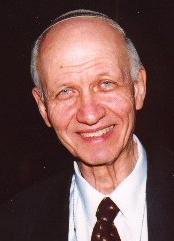Last week, NPR’s Morning Edition presented a thoughtful, in-depth series titled “Losing Our Religion.” Reporters tracked down an interesting array of people who had turned away from organized religion, though not necessarily from spirituality and prayer. I was struck by how many of them had lost faith as a result of a personal tragedy, especially the death of a loved one. I was even more struck by an assumption they seemed to share with the most fervent religious believers.
The assumption is that any deity worth its salt must be omnipotent. God (if there is one) must be able to stop a deranged gunman from storming an elementary school in Connecticut, or catch a falling tree just in time to spare the lives of a young couple walking their dog in Brooklyn at the onset of Hurricane Sandy. But what happens if God could not?
One person who has agonized over this is Rabbi Irving Greenberg, former chair of the United States Holocaust Memorial Council. He has peered at the question continually through the horrific lens of the Shoah. “In the presence of burning children, how could one talk of a loving God? I once wrote that no theological statement should be made that would not be credible in the presence of burning children,” Greenberg said of its victims, in an interview adapted in The Life of Meaning, by Bob Abernethy (and me).
Greenberg recalled that as a young Orthodox rabbi, at times he could barely speak the words of the prayers recited daily by observant Jews. “It would be almost a mockery of the children to speak of the God who—as we do in our central prayer—redeems the children and saves them for the sake of his great name,” he explained. “How could you say that in a generation where there was no liberation?”
Between Belief and Unbelief
Greenberg’s message to those interviewed by NPR would be, to start with: I hear you. “Even for the most devout people, there are moments when the ashes of the smoke of Auschwitz choke off any contact with God or heaven. Therefore, I came to see that the line between the believer and the doubter is much thinner than I once thought,” he said (in what was originally an on-air interview conducted by Susan Grandis Goldstein for Religion & Ethics NewsWeekly).
But he has kept his faith, partly with a fresh appraisal of covenant. In his interpretation of that biblical concept, God enters into a partnership with humans—and “self-limits,” as Greenberg puts it. God surrenders power, so that his/her Creation would have it.
Elie Wiesel … once suggested that the messiah, the all-powerful, deus ex machina God who saves us against our own will and ability—if that kind of messiah would come again now, it would be an outrage. It’s too late for such a messiah to come. It would have been a moral monster that could have come to save those children or to save those people and didn’t come.
But a God who wanted to intervene, and could not—that’s different, says Greenberg.
In a sense, to me, that’s the starkest, ultimate outcome. The fairy tale, the God of the white beard in heaven, all’s well with the world, the one who does it all for us, I think, is no longer credible, no longer possible. But a mature understanding of God who loves us in our freedom, who has called us to responsibility, who is with us at every moment—I think such a God is, if anything, more present and more close, and maybe, having suffered together and having shared our pain infinitely, is more beloved and maybe more inspiring to follow.
I don’t dismiss the perpetual question: If there’s an all-powerful God, how can such terrible things happen to the most innocent people? I just think the “if” could use some careful attention. …read more






